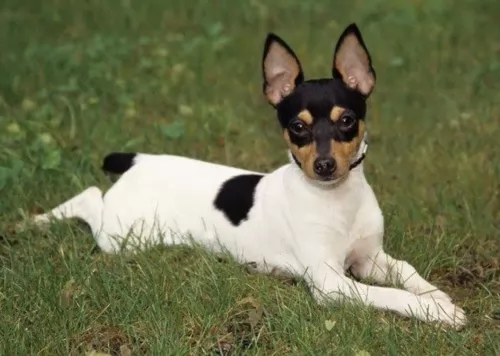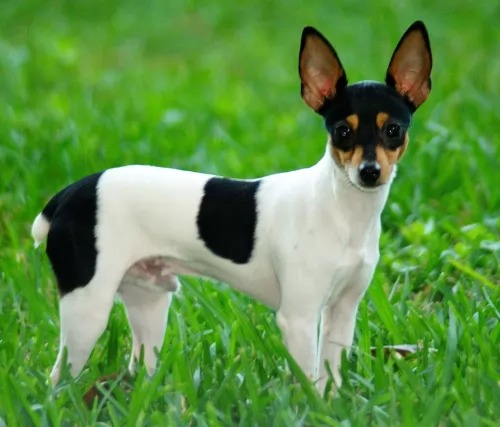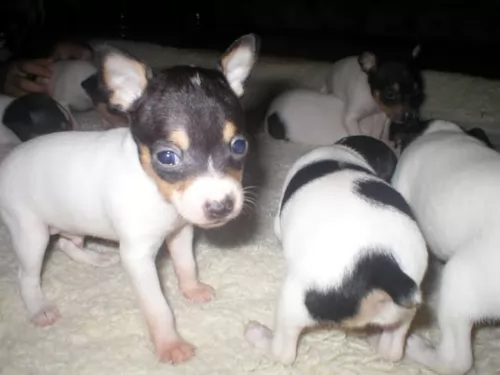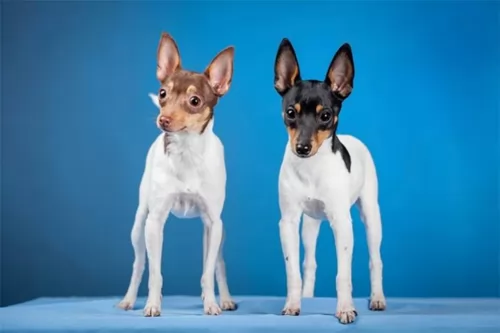 Petzlover
Petzlover Galgo Espanol is originated from Spain but Toy Fox Terrier is originated from United States. Galgo Espanol may grow 38 cm / 15 inches higher than Toy Fox Terrier. Galgo Espanol may weigh 25 kg / 56 pounds more than Toy Fox Terrier. Both Galgo Espanol and Toy Fox Terrier has almost same life span. Both Galgo Espanol and Toy Fox Terrier has almost same litter size. Both Galgo Espanol and Toy Fox Terrier requires Low Maintenance.
Galgo Espanol is originated from Spain but Toy Fox Terrier is originated from United States. Galgo Espanol may grow 38 cm / 15 inches higher than Toy Fox Terrier. Galgo Espanol may weigh 25 kg / 56 pounds more than Toy Fox Terrier. Both Galgo Espanol and Toy Fox Terrier has almost same life span. Both Galgo Espanol and Toy Fox Terrier has almost same litter size. Both Galgo Espanol and Toy Fox Terrier requires Low Maintenance.
 Galgo Espanol means Spanish with galgo meaning greyhound, thus a Spanish Greyhound. This breed is ancient with their roots in perhaps the English greyhound and others in the sighthound family. They are much like the greyhound in that they are laid back, calm, gentle and quiet, unless they are competing on the local track. Like the greyhound they are shy and reserved; great with kids and other pets. And of course, they love cats.
Galgo Espanol means Spanish with galgo meaning greyhound, thus a Spanish Greyhound. This breed is ancient with their roots in perhaps the English greyhound and others in the sighthound family. They are much like the greyhound in that they are laid back, calm, gentle and quiet, unless they are competing on the local track. Like the greyhound they are shy and reserved; great with kids and other pets. And of course, they love cats.
There are dogs like the Galgo referred to in writing by the ancient Celts and Romans. One author, Arrian, had his own Galgos and used them when hunting. The breed flourished in the second half of the Middle Ages in Spain and well into the 8th century. When the Christians regained control of the Iberian Peninsula, they did away with the hunter old forms of hunting and introduced a new form with hounds that made the Galgo the pride of the aristocracy and not in the homes of the ordinary people. Arrian claim to two types of dogs, the smooth and rough coated.
Muslim and Chrisitan Kings kept Galgo Espanols. In all probability the Saluke and Galgo were crossbred at this time. It was illegal to kill a Galgo and in 1081, the Mayor of Cartuario of Slonza left his Galgo in his will to Diego Citid. Dogs seen in painting from the 12th century look just like dogs of this breed who can be seen today.
It is believed that when the Galgo was developed, it was in the midsection of Spain or the Castillian plains. They ruled the interior of the country while the bloodhound ruled the exterior. The 18th and 19th centuries saw very little change in the breed. However, in the 20th century, there was cross breeding with the English greyhound that produced a leaner, faster and powerful track racing dog. The results was a faster dog without the long distance stamina of the pure Galgo. For this reason, the breeders returned to breeding the pure professional racing dog.
The sport of racing the Galgo earns Spain around sixty million dollars per year. They train anywhere from three to four thousand of the Galgos every year for Open Field Coursing Championships. Still, there no longer is any cross breeding between the Greyhound and the Galgo. The current coursing programs feature a hare that is much hardier and difficult to pursue so the stamina of the old Galgo Espanol is desired. In Castile, where these games are played, the landscape is open with large fields that requires that the hare travels far greater distances. This means that the stamina of the original Galgo Espanol is needed.
When not racing the Galgos have become great house pets. They have a reputation as gentle dogs that are docile and quiet, with good health. This reputation is well earned. They are also successful show dogs in Europe much more than the states. This is perhaps because they are really rare outside of Spain. They are not recognized by the United Kennel Club nor the American Kennel Club.
 The small Toy Fox Terrier was developed in the United States of America and is a smaller look-alike of the larger Smooth Fox Terrier.
The small Toy Fox Terrier was developed in the United States of America and is a smaller look-alike of the larger Smooth Fox Terrier.
Several toy breeds as well as the Smooth Fox Terrier were used to bring about the small Terrier dog.
Small though they are, they have had a role to play, particularly on farms where they've been used as ratters. They’ve also been used in circuses to perform tricks. These days they excel as being devoted companions of their human masters. These dogs are recognized by the United Kennel Club (UKC).
 Obviously the Galgos looks a lot like the Greyhound, but in some very important ways they are very different. The rear of the Galgos is higher than the front and their muscle are flatter. They are built for endurance while the Greyhound is built for speed. The Galgos is a lighter, smaller dog with larger ear on a long head. They have long tails and their chests are not deep like the Greyhounds.
Obviously the Galgos looks a lot like the Greyhound, but in some very important ways they are very different. The rear of the Galgos is higher than the front and their muscle are flatter. They are built for endurance while the Greyhound is built for speed. The Galgos is a lighter, smaller dog with larger ear on a long head. They have long tails and their chests are not deep like the Greyhounds.
The Galgo comes in smooth and rough coats and a variety of colors. The rough coat protects dogs that are in climates colder than the ones in Spain and also keeps them from injuring their skin while running. The colors include brindle, black, golden, toasted, cinnamon, yellow, red, white, white with patches, or any color as long as they have a white forehead and muzzle.
 The Toy Fox Terrier stands at between 22 – 29cm in height and weighs between 1.5 and 4kg. He is squarely built, with alert, dark eyes, and large, erect ears.
The Toy Fox Terrier stands at between 22 – 29cm in height and weighs between 1.5 and 4kg. He is squarely built, with alert, dark eyes, and large, erect ears.
The high set tail is nearly always docked. The coat of this dog is short and smooth and it sheds moderately. Color is mostly white with tan or black markings. The face is nearly always black and tan.
His body is lean, lithe and muscular and gives the impression of being well-groomed. The females give birth to between 2 and 6 puppies with the gestation period being 60-64 days. Have your dog spayed to avoid unwanted puppies.
Toy Fox Terriers are loyal, protective dogs and they make excellent watchdogs in terms of barking a lot when needed.
He is such a sport and wants to be part of all the activities that his human family are busy with. They make great playmates for older children, but care should be taken with toy breeds and small, undisciplined children who could hurt them.
These dogs also get on well with other pets in the home and they can adapt easily to life in the city or the countryside. He isn’t the brightest dog, but intelligent enough to learn some basic commands.
His deep loyalty to his human family makes him a little bit aloof with strangers. While he is eager to please, he also has a mind of his own and this is when training and socialization turn him into an obedient little dog.
He has loads of energy too and will rely on his human owners to take him on walks and play ball games with him.
 They are good with children, but you need to be careful no one gets knocked down or hurt.
They are good with children, but you need to be careful no one gets knocked down or hurt.
Stamina for running and a good record in lure coursing.
Though they can be couch potatoes like greyhounds they are better off with a fenced yard and not an apartment.
They are smart and can learn anything you want to teach them if you can keep their attention.
 Small and spunky, the Toy Fox Terrier is such an entertaining little pet, full of beans and curiosity.
Small and spunky, the Toy Fox Terrier is such an entertaining little pet, full of beans and curiosity.
He has sharp eyes and his hearing is good and this makes him a good watchdog. He is independent and intelligent, playful and jaunty.
When you allow one of these little dogs into your home, you’ll wonder how you ever got by without one, as he promises to be loving and loyal throughout your friendship with him.
 Being a large dog, the Galgo Espanol would normally face a high probability of hip dysplasia. Fortunately for the breed this is not true. In this respect their lightness of weight, their history as a working dog and their anatomy have protected them from it. They are however susceptible to other issues.
Being a large dog, the Galgo Espanol would normally face a high probability of hip dysplasia. Fortunately for the breed this is not true. In this respect their lightness of weight, their history as a working dog and their anatomy have protected them from it. They are however susceptible to other issues.
Malignant tumors that quickly spread throughout the body. Life threatening.
As a sighthound, the Galgo Espanol is prone to have issues anytime with anesthetics. They don’t metabolize the anesthetics like other dogs do. They will take longer to revive, and they are susceptible to hypothermia while under an aesthetic.
While running, they are prone to injuries
 Toy Fox Terriers are generally healthy, but like all breeds, they're prone to certain health conditions.
Toy Fox Terriers are generally healthy, but like all breeds, they're prone to certain health conditions.
It is highly unlikely he’ll get any of the common dog illnesses there are if he is looked after well, but he could.
This is a common dog disease of small breeds, and it is very similar to hip dysplasia. Problems with the femur causes wear and tear with arthritis coming about as well.
 Feed your puppy a high quality dry food made for large breed dogs. Feed 3 meals a day 2.5 to 3 cups total for the day.
Feed your puppy a high quality dry food made for large breed dogs. Feed 3 meals a day 2.5 to 3 cups total for the day.
Feed your adult Galgo a high quality dry food made for large breed dogs. Feed 2 meals a day but don’t overfeed Give 4-5 cups total for the day.
They have amazing stamina and good speed. Generally good health as a breed.
He can be a couch potato indoors and runs forever outdoors. He does need daily exercise and bedrest both. The best would be if you could sprint him every day or have a small yard he can play in. They excel of course at agility and lure coursing. Keep them on a leash because if they run you will never catch them. The American Sighthound Field Association presents lure coursing events that they are eligible for. They have exceled at show competition in Europe but are not well known in the U.S.
 This little dog is essentially a companion. Just like people get these little dogs to be a companion, the dog also needs to receive proper care too.
This little dog is essentially a companion. Just like people get these little dogs to be a companion, the dog also needs to receive proper care too.
Make sure your pet gets the right amount of food and also the right type of food. He’ll need food rich in vitamins and minerals. He’ll also benefit from wholesome home-made food – boiled chicken, brown rice, sweet potato, spinach and carrots – simple, harmless foods like that.
Don’t be tempted to pop peanuts, chocolates, grapes, onions and other human foods into his mouth as it can give your pet a stomach ache and diarrhea.
Get your pet to the vet if he’s sick. He’ll need vaccines too to prevent some of the deadly canine diseases there are.
Provide your pet with adequate games and other forms of exercise. Exercise is essential for good health.
Spay or neuter your dog to avoid an unwanted litter of puppies. There are health benefits to having this done too.
Groom your small dog regularly and get rid of those loose hairs. With his short hair, the Toy Fox Terrier is considered to be a low maintenance dog.